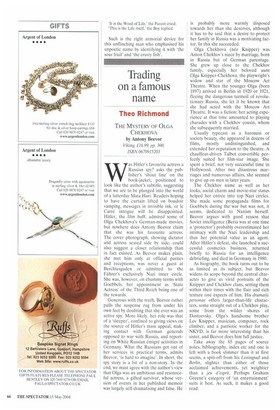Trading on a famous name
Theo Richmond
THE MYSTERY OF OLGA CHEKHOVA by Antony Beevor Viking £16.99, pp. 300, ISBN 0670915203 \vas Hitler's favourite actress a Russian spy? asks the publisher's 'shout line' on the book-jacket, positioned to look like the author's subtitle, suggesting that we are to be plunged into the world of a latterday Mata Hari. Readers hoping to have the curtain lifted on boudoir vamping, messages in invisible ink, or le Cane intrigue will be disappointed. Hitler, the film buff, admired some of Olga Chekhova's German-made movies, but nowhere does Antony Beevor claim that she was his favourite actress. The cover photograph, showing dictator and actress seated side by side, could also suggest a closer relationship than in fact existed. As Beevor makes plain, she met him only at official parties and receptions, was never a guest at Berchtesgaden or admitted to the Fiihrer's exclusively Nazi inner circle. She was, however, on chummy terms with Goebbels, her appointment as 'State Actress' of the Third Reich being one of the rewards.
Generous with the truth, Beevor rather pulls the suspense rug from under his own feet by doubting that she ever was an active spy. More likely, her role was that of a 'sleeper', confined to giving views on the source of Hitler's mass appeal, making contact with German generals opposed to war with Russia, and reporting on White Russian émigré activities in Germany. What the Russians got out of her services in practical terms, admits Beevor, 'is hard to imagine'. In short, the spy story is a bit of a non-story. In the end, we must agree with the author's view that Olga was an ambitious and resourceful actress, a gifted survivor, whose version of events in her published memoir was largely self-dramatising and false. He is probably more warmly disposed towards her than she deserves, although it has to be said that a desire to protect her family in Russia was a motivating factor. In this she succeeded.
Olga Chekhova (née Knipper) was Anton Chekhov's niece by marriage, born in Russia but of German parentage. She grew up close to the Chekhov family, especially her beloved aunt Olga Knipper-Chekhova, the playwright's widow and star of the Moscow Art Theatre. When the younger Olga (born 1897) arrived in Berlin in 1920 or 1921, fleeing the dangerous turmoil of revolutionary Russia, she let it be known that she had acted with the Moscow Art Theatre. It was a fiction: her acting experience at that time amounted to playing charades with a Chekhov cousin, whom she subsequently married.
Usually typecast as a baroness or society beauty, she appeared in dozens of films, mostly undistinguished, and extended her reputation to the theatre. A chauffeur-driven Talbot convertible perfectly suited her film-star image. She spent a brief, not very successful time in Hollywood. After two disastrous marriages and numerous affairs, she seemed to give up on men in later years.
The Chekhov name as well as her looks, social charm and movie-star status helped her entrée into top Nazi circles. She made some propaganda films for Goebbels during the war but was not, it seems, dedicated to Nazism herself. Beevor argues with good reason that Soviet intelligence (Beria was at one time a 'protector') probably overestimated her intimacy with the Nazi leadership and thus her potential value as an agent. After Hitler's defeat, she launched a successful cosmetics business, returned briefly to Russia for an intelligence debriefing, and died in Germany in 1980.
As biography, the book turns out to be as limited as its subject, but Beevor widens its scope beyond the central character to give us vivid portraits of the Knipper and Chekhov clans, setting them within their times with the flair and rich texture one expects of him. His dramatis personae offers larger-than-life characters, some straight out of a Chekhov play, some from the wilder shores of Dostoevsky. Olga's handsome brother Lev Knipper, musician, composer, rock climber, and a patriotic worker for the NKVD, is far more interesting than his sister, and Beevor does him full justice.
Take away the 65 pages of source notes, bibliography, index etc and one is left with a book slimmer than it at first seems, a spin-off from his Leningrad and Berlin, slighter than either of those acclaimed achievements, yet weightier than a jeu d'esprit. Perhaps Graham Greene's category of 'an entertainment' suits it best. As such, it makes a good read.


































































































 Previous page
Previous page